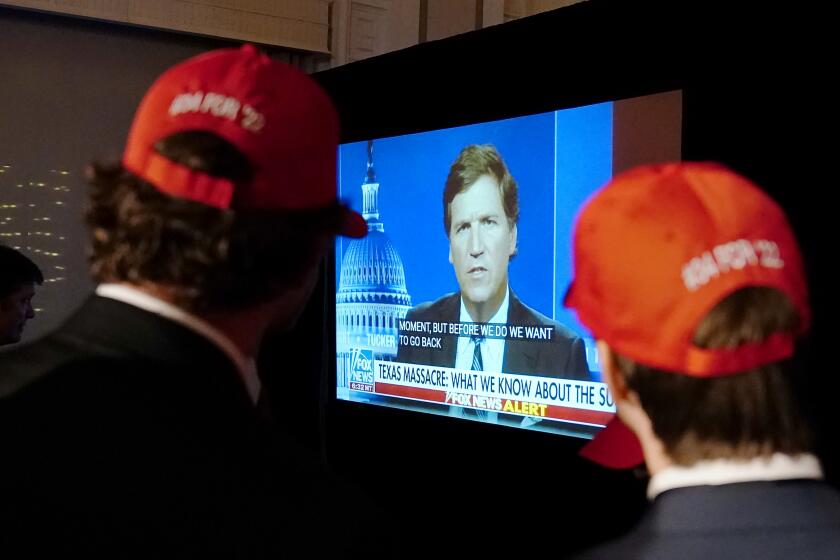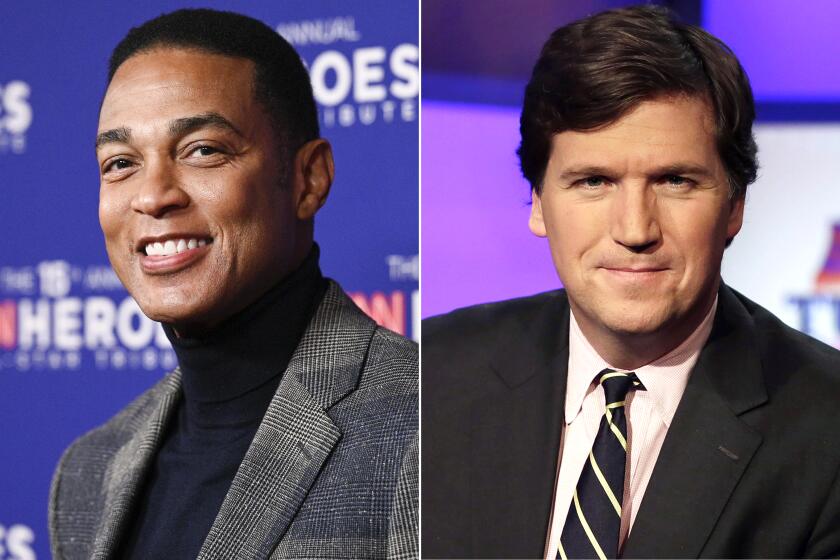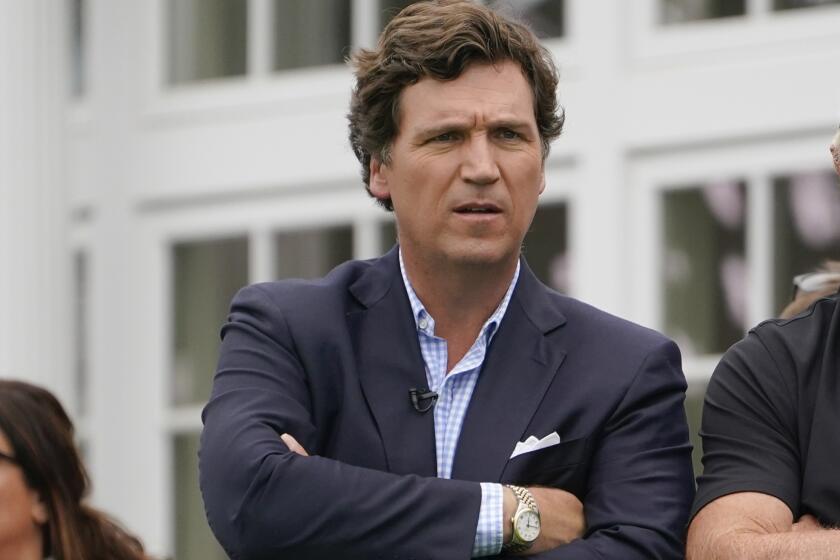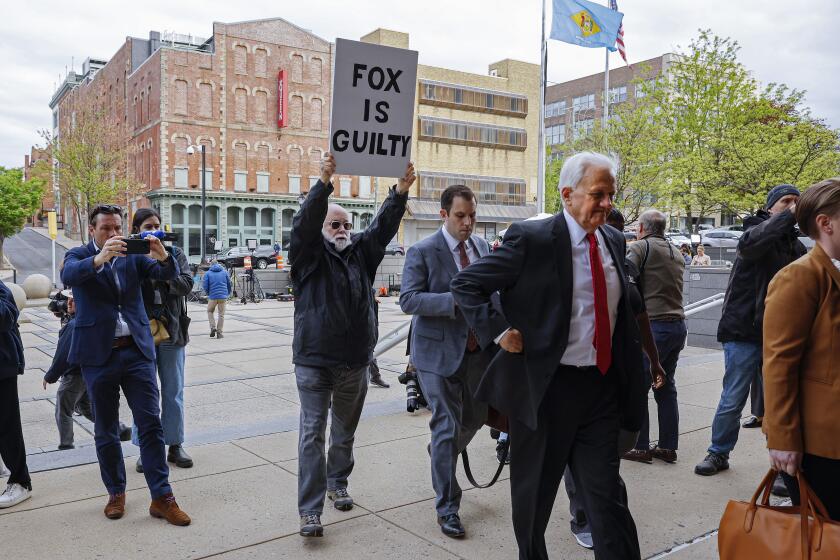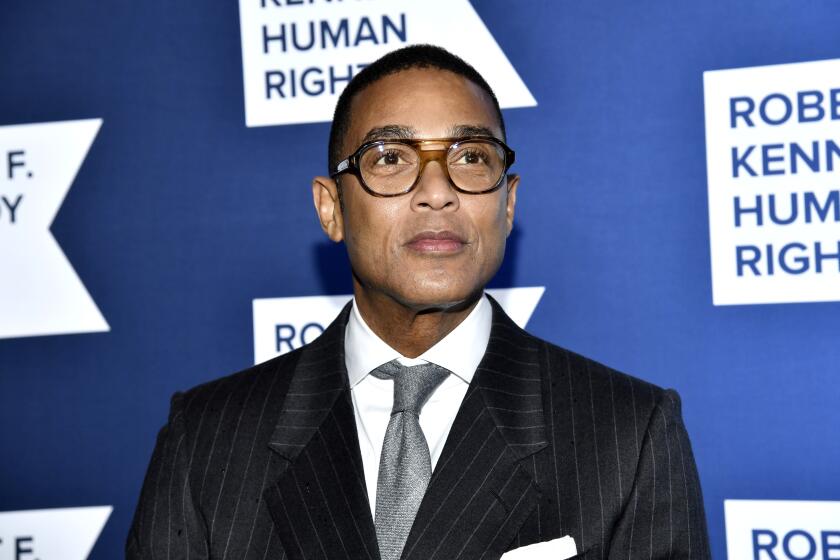Tucker Carlson is about to find out if he’s bigger than Fox News
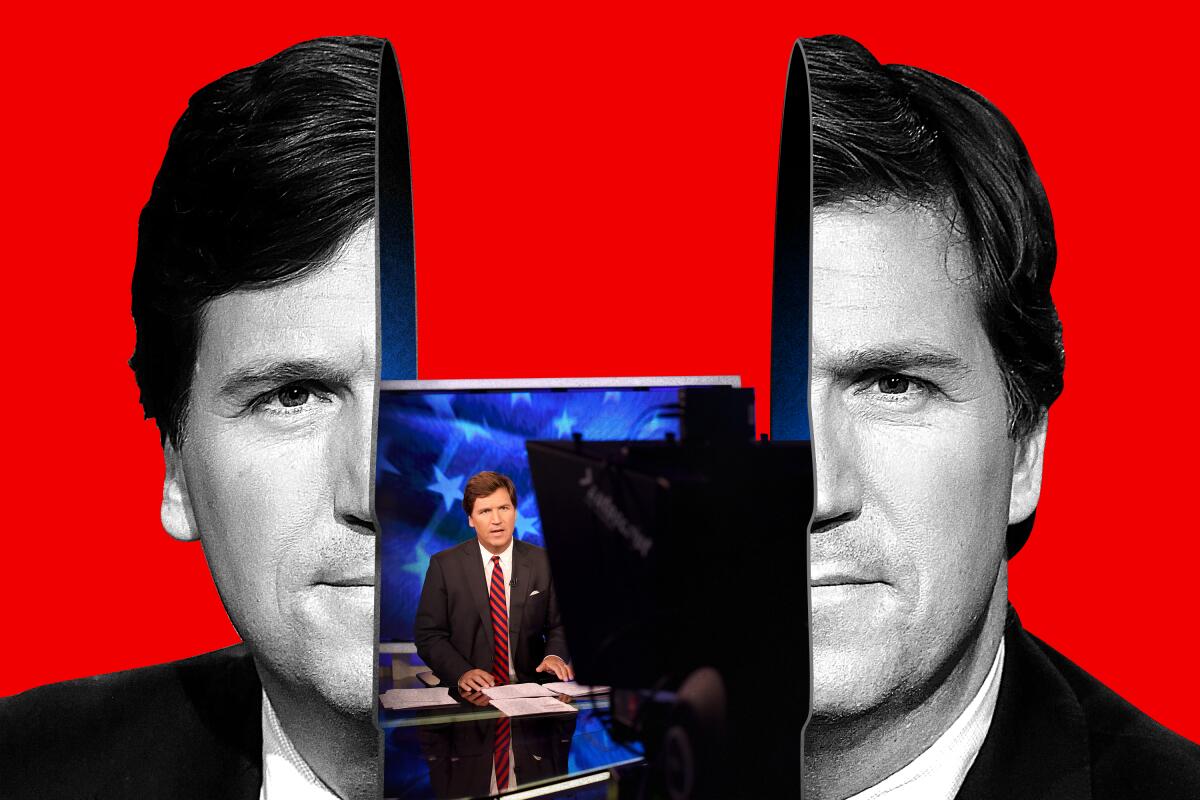
- Share via
There are many reasons Tucker Carlson’s substantial fan base might abandon him.
Blockbuster texts revealed that his private words didn’t match some of the views he sold publicly every weeknight to millions of loyal viewers. A lawsuit charged that he contributed to a hostile work environment of bullying and conspiracy-mongering. And when Fox News fired him Monday as host of the highest-rated show on cable television’s most popular news outlet, the glib and combative star lost his direct line into the households of American conservatives.
Many media figures might be cowed by the string of beatdowns. But the shape-shifting Carlson has recovered from previous career calamities — which now includes the rare distinction of being fired by all three major cable news channels. He has managed, every time so far, to not only rebound but to expand his audience, while moving toward darker and more divisive themes.
Can Carlson repeat the pattern and do what other once-dominant voices could not: Expand his audience and influence without the market-leading platform of Fox News?
Tucker Carlson’s last program was Friday, Fox News said. His ouster is probably related to a discrimination lawsuit filed by a former producer.
Carlson’s fall from the coveted 8 p.m. time slot at Fox, which he hosted for six years, was unimaginable to both fans and critics of Fox News. The host’s merciless interviews of liberal activists and willingness to air America’s ugliest impulses in prime time made him a hero to many conservatives.
He was known, at least publicly, as a close ally of former President Trump, who told Newsmax late Monday he was “shocked” by the departure, adding: “He’s a very good person, a very good man and very talented and he had very high ratings.”
The 53-year-old son of a media executive occupied a critical position inside Fox. “Tucker Carlson Tonight” reached an average of more than 3 million viewers every weeknight, more than any other cable news host. But his impact redoubled as Fox’s daytime programs replayed his segments and the Fox Nation streaming service posted Carlson stories and documentaries.
Analysts who followed his work closely said Carlson helped bring ideas that began on the political fringe — skepticism about the outcome of the 2020 presidential election, doubts about COVID treatment protocols, the unproven claim that government operatives spurred the Jan. 6 Capitol insurrection — into the most important conservative outlet.
Said conservative commentator Charlie Kirk: “He was more powerful than anybody else since the death of Rush Limbaugh in reshaping the right.”
Carlson has remained mum since being bounced from the cable network, with no chance to give a last word, since his bosses declined to allow him a final appearance after his firing. A Carlson representative did not respond to a request for comment.
His sudden departure was not entirely unlike the 2017 termination of Bill O’Reilly, who was similarly riding high as the most-watched host on Fox and all of cable.
How the media reacted to the firings of the Fox News and CNN hosts is a signal of the power that cable TV news, and its anchors, continues to wield.
Fox executives booted O’Reilly after the New York Times revealed that the cable giant had quietly settled complaints by five women about sexual harassment and other inappropriate behavior. A wave of advertisers dumped his show and women’s rights groups demanded he be shown the door.
The revelations packed extra wallop because Fox had promised the prior year to promote a more respectful culture for women after Roger Ailes lost his job as Fox News chairman in another sexual harassment scandal.
In the aftermath, O’Reilly launched a podcast and then a video streaming version of his “No Spin News.” He completed a national speaking tour with comedian Dennis Miller and, later, with Trump after Trump left the White House. He ramped up publication of books, most notably the “Killing” series, about the life and demise of historic figures.
Billoreilly.com drew just short of 1.2 million visits a month for the first three months of this year, according to the data tracking firm Similarweb. Memberships to access much of the content begin at $5.42 a month.
The various lines of business — including merchandise branded “Team Normal,” as opposed to those he derides as “Team Crazy” — mean O’Reilly is “probably doing very well for himself, though we have no idea the exact revenue that’s coming in,” said Dan Cassino, a professor of government and politics at Fairleigh Dickinson University who wrote a book on Fox News.
But income doesn’t equal influence, and O’Reilly no longer finds himself at the center of the daily discussion on the right over who and what should be the focus for activists and for the Republican Party.
The GOP is unlikely to pivot away from Tucker Carlson’s message. Who will replace him as Fox’s darling of the right?
Much the same could be said of Glenn Beck, who starred on Fox from 2008 to 2011. He at one time outdrew CNN, MSNBC and HLN combined, but like O’Reilly was criticized for misleading and inflammatory commentary. By 2011, Ailes explained that Beck focused too much on outside causes and projects, rather than his Fox program.
Fox allowed Beck a final show before he signed off. He immediately began streaming from his own internet outlet, GBTV. The year after it started, the eponymous streamer, according to a source cited by the Wall Street Journal, had 300,000 subscribers paying up to $9.95 a month, to help generate revenue of $40 million or more.
Beck later alienated many on the right when he spoke out strongly against Trump, making semi-oblique comparisons between the then-candidate and Hitler and calling the Republican “a very dangerous man” for American democracy. But by 2018 Beck had fallen into line, donning a red “Make America Great Again” hat and saying he supported President Trump.
Still, Beck has never regained his place near the top of the conservative punditocracy.
Immediate reaction from fans and other right-wing political commentators to this week’s blockbuster announcement painted Carlson not as a serial cable TV loser but as a truth-teller shunned by his corporate bosses for daring to enlighten viewers about America’s sick culture and institutions.
Fans and other conservative commentators urged Carlson to embrace the role of free speech martyr and to return to the media fray, perhaps on a far-right streaming service. Said one fan on Twitter: “Thanks for telling the truth at all cost.”
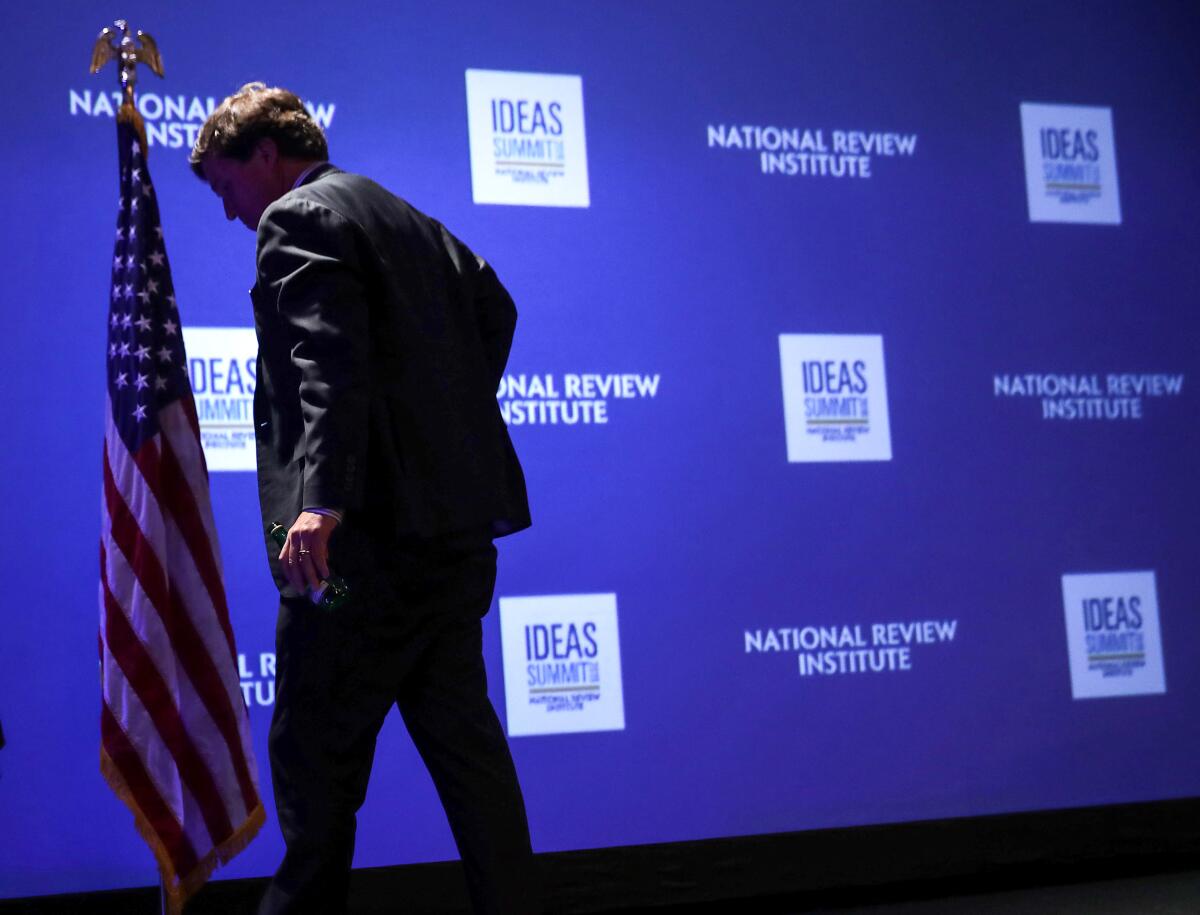
“It’s likely he’ll transition onto some new media platform or to start his own media platform,” said Cassino, author of “Fox News and American Politics: How One Channel Shapes American Politics and Society.” “He’ll probably want to monetize the audience he’s got, and the easiest way to do that is to have a website, have a podcast [or] a streaming service.”
Cassino also predicted that Fox will suffer only a temporary loss of viewers from Carlson’s coveted 8 p.m. time slot. He noted that polls showed viewers did not approve of the 2017 ouster of O’Reilly, Carlson’s predecessor and also Fox’s top-rated host. But ratings in the 8 p.m. slot remained robust.
Angelo Carusone, president of the liberal media watchdog Media Matters for America, suggested that Carlson might take his show to Rumble.com. The site has become a go-to for far-right web operators who were kicked off the major social media and tech companies for spreading the QAnon conspiracy theory.
Rumble has positioned itself as a YouTube alternative that is “immune to cancel culture.” It drew an average of 80 million monthly users worldwide in the fourth quarter of last year, according to a public filing, though that paled compared to YouTube’s global audience of nearly 2.7 billion a month. While executives at the site claim neutrality, right-leaning commentators have flocked there, including Dan Bongino, the blunt former New York City cop who left his part-time commentary post at Fox last week.
With a reported $338 million in cash and equivalents (as of the end of last year) and big investors like conservative entrepreneur Peter Thiel, Rumble has the wherewithal to lure Carlson, said Carusone.
The Fox network was just protecting the bottom line in firing Tucker Carlson, not purging a blight on American democracy.
Few who knew Carlson at the start of his media career would have guessed where he would end up. He liked to tell the story of how his father — once the top executive at the Corporation for Public Broadcasting — told him to look for a job as a journalist because “they’ll take anybody.” He quickly progressed from a fact checker to the author of biting profiles praised by prominent editors like Tina Brown for their sharp observation.
He also signaled that, despite a native conservative bent, he would not bow down to Republicans. His profile of George W. Bush for Talk magazine had the then Texas governor issuing multiple F-bombs and mimicking a death row inmate who had pleaded for her life. (A Bush spokeswoman said the portrait was inaccurate.)
Carlson has depicted his shift to TV as almost accidental. It began with a chance appearance on “48 Hours” to talk about the O.J. Simpson murder case. Soon he became a regular guest on cable, leading to a chance at the start of the new millennium to host the CNN program “The Spin Room,” along with a liberal foil, Bill Press.
Despite the show’s quick cancellation, Carlson landed a role on the network hosting the argumentative “Crossfire,” with Paul Begala. The most remembered moment from the show might have been when Jon Stewart roasted the hosts and pleaded with them to “Stop, stop, stop, stop hurting America.”
Carlson bounced from CNN to MSNBC, where he promised less vitriolic fare. But his ratings were low and the network, moving to the left, canceled his show in 2008.
He briefly pivoted back to the written word, co-founding the conservative website the Daily Caller. But by 2009 he had been hired at Fox News, where his role would expand with each succeeding year.
Close followers of the program said Carlson increasingly drew themes from the fringe. One notable and oft-repeated theme was replacement theory — the notion that left-wing elitists wanted to “replace” and take power from white Americans.
By importing immigrants, Carlson warned, Democrats and the left would cultivate a group of more “obedient voters” who would help them to maintain power.
Mainstream critics slammed Carlson for stoking racism and xenophobia. But to many of his adherents, such critiques from journalists and academics served as validation of their beliefs.
His combative persona and provocations, however, have poised him for pitfalls.
A lawsuit filed late last month by a former Fox News producer, Abby Grossberg, charges Fox, Carlson and other employees with discrimination. The action claims Grossberg was bullied and subjected to sexist and antisemitic comments while working as head of booking for Carlson. She also charged that company lawyers coerced her to change her testimony in the massive Dominion defamation case. (Fox last week agreed to pay more than $787 million to settle with Dominion, a voting systems company.)
Rupert Murdoch’s Fox News avoids a potentially embarrassing trial with Dominion Voting Systems over its false reporting on allegations of 2020 election fraud.
Fox said Grossberg’s claims are “riddled with false allegations against Fox and our employees.” It said it terminated the producer for revealing privileged corporate information in her lawsuit.
Perhaps more problematic for his fans are Carlson’s private — and none too flattering — thoughts about Trump, which became public via discovery in Dominion’s defamation case.
In the texts, Carlson belittled Trump’s record as a businessman, slammed the former president for not attending Joe Biden’s inauguration, pined for a time when he would no longer have to talk about Trump and expressed a deep disdain for a man he called “a demonic force, a destroyer.”

Carlson also criticized his own network’s White House correspondent in a text to fellow Fox personalities Laura Ingraham and Sean Hannity. The correspondent had cast doubt on allegations of voter fraud tied to Dominion. Carlson apparently worried that conspiracy-minded Fox viewers would shift to other outlets.
“Seriously ... What the f—? I’m actually shocked...” Carlson texted. “It needs to stop immediately, like tonight. It’s measurably hurting the company. The stock price is down. Not a joke.”
Nearly two decades earlier, Carlson wrote about the peril for a public figure caught in such a bind. In his 2003 book “Politicians, Partisans, and Parasites: My Adventures in Cable News,” he addressed the potential risk for a host like O’Reilly if he behaved differently in public than in private.
“O’Reilly’s success is built on the perception that he really is who he claims to be,” Carlson wrote. “If he ever gets caught out of character, it’s over. ... He’ll make the whatever-happened-to ... ? list quicker than you can say ‘Morton Downey, Jr.”
How a series of missteps led to Lemon’s fall from grace, just two years after ‘Don Lemon Tonight’ became the cable network’s prime-time flagship.
If there are Carlson fans calling out such a disparity in his public and private thoughts about Trump, they appear to be in a minority, at least for now.
The conservative writer Ben Shapiro was among many on the right springing to Carlson’s defense after the firing, tweeting: “@TuckerCarlson is immensely talented and one of the most important voices on the right, and he’s going to continue to be those things no matter what comes next.”
In past interviews, Carlson has waxed philosophical about the fleeting nature of prominence. In an undated interview with Kirk, the Carlson gives advice to young people: have lots of kids, live fully, don’t waste time.
“You can’t control all this stuff that’s going on,” Carlson said in a long riff, positioning himself — despite his considerable wealth and prominence — as vulnerable. “You can’t control what Google does. And, honestly, they’re gonna win. The powers-that-be will win, at least in the short term. Ultimately, they’ll all blow up. But, like, we’re powerless and hated.
“Are they going to crush me? Oh, yeah. OK. But in the meantime, you know, I want to experience my life as fully as I possibly can.”
Many Carlson backers took that last statement as prophetic, a sign that shadowy forces would do anything to stop their hero.
Cassino saw something different — “performative victimhood.”
“It’s saying, ‘I am the victim here, so everyone should rally behind me,’ ” Cassino said. “Does it work? Well, look at Donald Trump. It’s worked very well for him for the past eight years. So why would anyone else want to give up on that?”
More to Read
The biggest entertainment stories
Get our big stories about Hollywood, film, television, music, arts, culture and more right in your inbox as soon as they publish.
You may occasionally receive promotional content from the Los Angeles Times.

